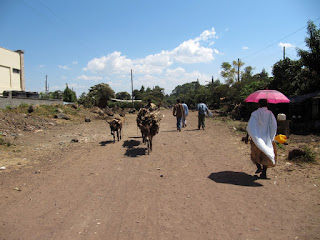(Continued from Blog post no - 20)
What do the Ethiopians get in return for the two birr they paid.
They get to watch the live telecast and also get a free chilled coca (Coca-Cola).
The regular price of the coke in the market too is two birr. So how do
Ethiostar or the other hotels that extend the same service get benefited? Simply
it’s the hotels’ way of paying back to the society. Most of the youngsters
watching the live telecast are from the local community and they are literally
the ears and eyes of that area.
 |
| watching EPL match in a hotel |
And as we know that it is always better to be in friendly terms with
the immediate environment in which a business operates. Coca-Cola missed out on
building more good will. If Coca-Cola had added some Kolo or a Dabo Kolo, the
good will would have increased by leaps and bounds. Delight the customer and
make him the brand advocate for a life time!
 |
| Manchester United Fans, Ethoipia |
But the rivalry that generates the maximum fun, enjoyment, and
ribbing and sometimes even clashes and scuffles are the bi-annual matches that
involve Manchester United and Arsenal. Manchester United and Arsenal are top
notch Premier clubs that boast of fierce fans who are ready to do anything for their
team.
 |
| Arsenal Fans and Flags |
Come Sunday and we have supporters coming with huge towels or
flags with their team colours and logos and they would boisterously support their own teams.
The support for both teams was uniform and other wise close friends almost come
to blows over a penalty missed or some injustice meted out to their teams. Arsenal
was more popular than Manchester United as Arsenal had more black and players
of African origin. Once I watched a Manchester United Vs Arsenal match in BDU
auditorium and it will remain as one of the most enjoyable interactions with
the football crazy Ethiopians.
Another
interesting ethnic game that I saw being played is ‘Tezer’. In this game first a
suitable pole is chosen. A long rope may be of two or three feet is firmly tied
to the middle section of the pole. At the other end of the rope a small
round ball made by a roll of plastic sheet shoved into socks
is fixed. The rule of the game is that the players should not touch the rope to
which the ball is tied. Also the ball should not touch their clothes. When
kicked, if the ball finishes revolving around the pole unchecked by the player
in the defender position, the player who kicked the ball will be a winner. I found the acrobatics involved in the game
to be of very high calibre!
I should thank my student and now a distinguished faculty at department of accounting, BDU, Dr. Elefachew Mossisa who has guided me in identifying this game and telling me its name. Betam Konjo (very Good) and ahmesugenalew (thank you) . Also I should also thank Hider Ali, who has sent very old and rare photos.I will be use them later Hider.
Of course fun loving Ethiopians also play the loud and very
boisterously ‘foosball’. Ethiopians call it Joteni (thanks to Dr. Elefachew Mossisa again) . Table football, also called fuzboll and sometimes table
soccer. Foosball is a table-top game that uses figures
representing football players, fixed on rotating rods. To begin the game, the ball is served through a hole
at the side of the table, or simply placed by hand at the feet of a figure in
the centre of the table. The initial serving side is decided with a coin toss.
Players attempt to use figures mounted on rotating bars to kick the ball into
the opposing goal. Expert players have been known to move balls at speeds up to
56 km/h (35 mph) in competition.
It is a very engrossing game, but tends to get very noisy. In
the chilly evening breeze slightly tipsy Ethiopians and sometimes even
foreigners engage and enjoy this maddeningly intoxicating ‘foosball”.














































